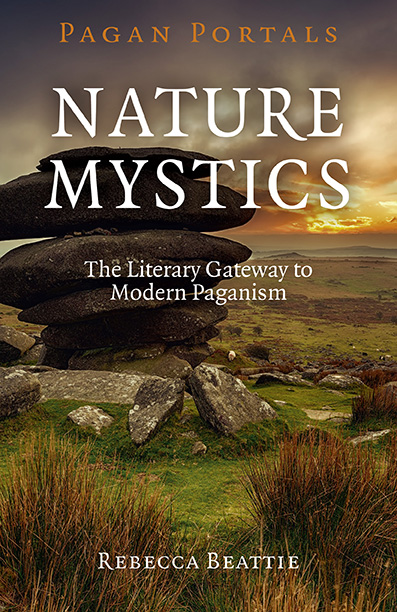- Home
- Editor's Notes
- Current Issue
- Riki Reflects
- Spiritual Traveler
- Starz Emporium
- Classifieds
- Advertise with Us
- Submissions
- Awards
- About Us
- Contact Us
Nature Mystic
By Rebecca Beaatie
 Mary Webb: Nature Mystic
When the atmosphere of the house became too thunderous and Amber’s nerves were strained to breaking-point, she crept away to the upper woods… Something watched there; something waited; on this side or that, always a little above her, a little beyond… Young and fugitive it seemed, as the babythrush that hopped in callow dignity across her path, yet darkling and terrific as the core of a thunderstorm. When she turned quickly it was gone, like the shy emmet, slipping under the layers of the leafy, ferny wood; it was fled like the night-wandering moth into the topmost heavy platform of the pine, fused in fierce moonlight. So her going into the green world had in it something of a religious rite. In her 1920 novel, ‘The House in Dormer Forest’, author and poet Mary Webb, describes a journey her female character, Amber Darke, takes through the woods. The episode is a remarkable piece of writing for several reasons. Firstly, Webb was writing at a time when the understanding of what constitutes a spiritual life did not have the diversity we now enjoy. For a writer living in traditionally Christian England, the ideas expressed were remarkably pagan (long before the revival of modern pagan viewpoints in the later twentieth century). Also, Amber’s walk through the forest was not just a fictional episode, but also echoed Webb’s own experiences. Amber Darke, like her creator, was a Nature Mystic. The journey through the fictional Dormer Forest to reach the Upper Wood was also a journey through the layers of consciousness to reach a higher level. Once this higher state was achieved, the mystic experiencing this form of consciousness could then encounter the (illusive) divine force, and be blessed by it. For Amber, this was a flight from the oppression of her home, and for Webb this was an escape from illness, and the sadness of her own life. In her adolescence, suffering from debilitating bouts of Grave’s Disease, the only treatment prescribed by doctors was time in nature. So Webb was often to be found recuperating in the hammock in her garden, or sitting very quietly in her favourite spot in nature for long periods. Later, following the loss of her Father, her marriage and her subsequent periods of exile from her beloved home county of Shropshire in England, time in nature became a consolation as well as a healer. Not only did Webb meditate in nature for extended periods, she also preferred to do everything she could outdoors. Her younger siblings remembered her eating every meal in the garden, come rain or shine. Always a poet as well as a Nature Mystic, when Webb began to write fiction in her thirties, Nature Mysticism became part of her compositional practice. Webb would be seen sitting amongst meadow flowers by farm workers going to the fields in the morning, and very often she would still be there at the end of the day. These periods of extended meditation would then result in furious episodes of writing, once Webb had the plotline and the characters all figured out. Her writing was so fast that her husband had a special pen made for her, one that allowed the ink to move more quickly, and, according to her principle biographer Gladys Mary Coles, her first novel was written in three weeks. Webb’s favourite spot to write in was her garden or on her veranda, and when she was away from her home county, living in other parts of England such as London and the West Country, she often struggled to find her muse. Her novels, all set in Shropshire, are characterised by her intense eye for detail, her inspiring and poetic descriptions of the natural world, vivid depictions of folklore, and what academics often refer to as ‘occult themes’, themes that will be more familiar to those following a nature based spiritual path now. For Webb, nature was sacred, and an expression of the divine. This belief system was then reflected in many of her female characters. In Webb’s world, to commune in nature is to encounter the divine, and it becomes an act of worship. Amber’s journey to the upper wood continues in this way: Through a company of fir trees set with points of bright green flame she came at last to the upper wood, and was instantly at grips with beauty. There was for her something of a wrestling, of the mood which says: ‘I will not let thee go until thou bless me,’ in her communings with nature. Like many writers, Webb’s work has gone through periods of popularity and obscurity, all of them posthumous. Her early death at the age of 46, from complications due to her illness, meant that she was not able to enjoy the fruits of her labour. Internationally, the reading public embraced her throughout the late 1920s and 1930s, during the Countryside Revival. She also had periods of popularity during the 1950s, when Michael Powell and Emeric Pressburger filmed her novel, ‘Gone to Earth’. Later, in the 1980s, the BBC dramatized her most well loved novel, ‘Precious Bane’, which was then viewed across the world. Exploring Webb’s novels, and her poetry, is a worthy pursuit, and one that is very satisfying. For those with an interest in becoming enlightened and empowered, Webb offers a window into another world, where folk traditions come alive and the magical forces of nature take root in the soul of the observer, and impart wisdom and inspiration. Her nearest literary cousins (in terms of more well known authors) are writers like D.H. Lawrence and Thomas Hardy, both of whom wrote stirring novels of human drama that were deeply rooted in their own locality and in the natural world. Like Webb, Lawrence preferred to write whilst sitting beneath a tree, and had a mystical kinship with the natural world. Hardy, like Webb, rarely set his work in anything other than his native countryside, and evoked a rural lifestyle in a world that has long since passed. Webb’s novels and her poetry are full of observations that encourage us to pause in the busyness of our own lives, and remember the beauty in the small details that are all around us, even if, like me, you live in a modern urban setting. Rebecca Beattie can be found at www.rebeccabeattie.co.uk or at www.facebook.com/Rebeccabeattie13 |
Share this article with friends!
|
Copyright © 1998 - 2025 Mystic Living Today All rights, including copyright, in the content of these Mystic Living Today web pages are owned or controlled for these purposes by Planet Starz, Inc. Terms of Service Disclaimer and Legal Information For questions or comment, contact Starzcast@mysticlivingtoday.com. Reproduction of this page in any form is not allowed without permission of the author and the owner of this site. All material on this web site, including text, photographs, graphics, code and/or software, are protected by international copyright and trademark laws. Unauthorized use is not permitted. You may not modify, copy, reproduce, republish, upload, post, transmit or distribute, in any manner, the material on this web site. Unless permissions is granted. |



